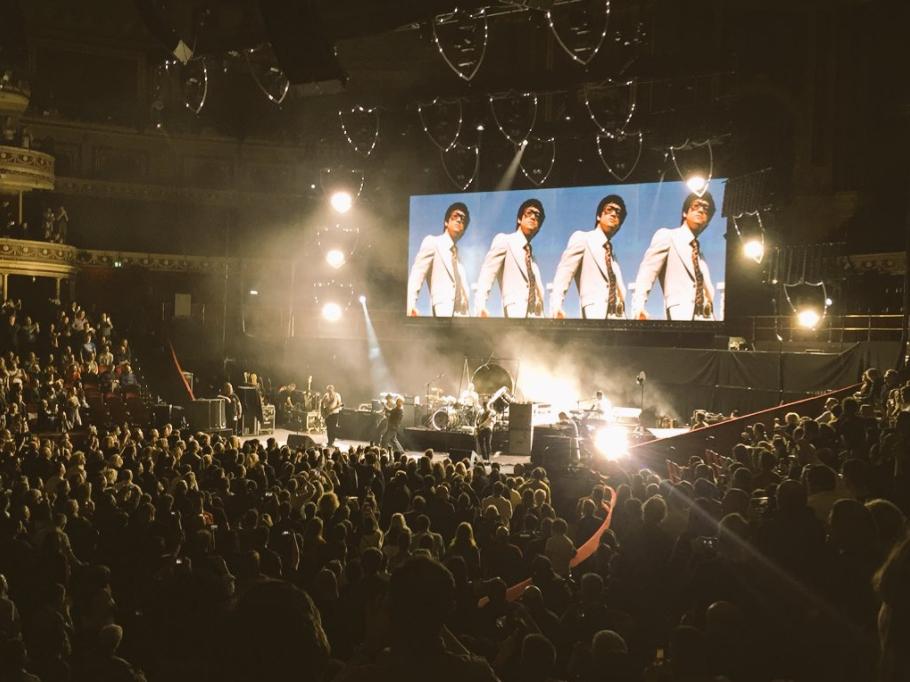Morrissey is an intractable, unapologetic mix of unpleasantness and fading brilliance – review
Long-time card carrying Mozites have got used to the sinking feeling that comes whenever he opens his mouth, and the sense that the beauty and humanity he eloquently represented with The Smiths is irreversibly replaced by misanthropy

In the middle of this third night of four sold out London shows, Morrissey is about to reach the chorus of his melodramatic, sweeping ballad “Home is a Question Mark”, a highlight from last year’s album Low in High School, when a man at the front of the crowd unfurls a Union Jack flag, waving it proudly.
When he does so again during the final song of the night, a rousing “Irish Blood, English Heart”, the former Smiths frontman makes a beeline for it and emphatically gestures his approval. Given Morrissey’s recent “Ukipification” – in the last 18 months he has praised Nigel Farage as a “liberal educator”, called the EU referendum result “magnificent” and peddled the conspiracy theory live on BBC 6 Music that the anti-Islam candidate Anne Marie Waters was fiddled out of the party’s leadership contest – you don’t have to be a bleeding heart liberal to realise how this episode could be interpreted.
That this happened on the day that the NME’s final print edition was published added a mischievous undercurrent: the magazine’s criticism of Morrissey for waving the flag during a concert supporting Madness in 1992, the point at which all subsequent controversy is rooted, was the first sign that Morrissey’s halo was slipping.
It was an uncomfortable moment in a show that sums up Morrissey in 2018: an intractable, unapologetic mix of unpleasantness and fading brilliance. Long-time card carrying Mozites (of which I count myself) have got used to the sinking feeling that comes whenever he opens his mouth, and the sense that the beauty and humanity he eloquently represented with The Smiths is irreversibly replaced by misanthropy. In 2010 he called the Chinese a “subspecies” over their animal rights record; last year he told German newspaper Der Spiegel the country’s refugee policy had made Berlin “the rape capital of Europe”, and appeared to defend actor Kevin Spacey against sexual assault allegations made against him.
Still smarting from the fallout, tonight he orders his band to wear T-shirts branded with the words “no one likes us we don’t care”. It’s one of several wilfully antagonistic moves (a fight between skinheads breaks out at the front) that mar the show: during the end to Low in High School’s best track, “Jacky’s Only Happy When She’s up on the Stage”, Morrissey changes the lyrics of the highly charged climax from “exit, exit” to “Brexit, Brexit”. After the don’t-vote-cos-there’s-no-point call to arms of 2014’s “World Peace is None of Your Business” he makes a plea for an “open debate” and to bring back free speech, although given his track record you do have to wonder what exactly it is he thinks he’s not permitted to say.
Does any of this matter? People would argue not: tonight Ally Pally is packed to the rafters, which suggests enough people are willing to forgive, or at least momentarily forget... though far fewer of them seem fully engaged with what they’re watching
An unbending setlist does nothing to help: three albeit astutely judged covers (Elvis Presley, Ramones and Pretenders), three B-sides (of which 1992’s “Jack the Ripper” remains an unsettling, stirring lost classic) and an unsparing selection from the substandard Low in High School, which is too often infiltrated with his spiteful world view.
“My Love, I’d Do Anything for You” deploys that most modern, Trumpian trope decrying the “mainstream media” and establishments that mean “we can’t live as we wish”, but with its blaring horns at least the tune is memorable (if Ukip can still muster up enough members to fill a local disco hall, it’d be a floor filler). “Who Will Protect us From the Police” is as unsophisticated musically as lyrically; the sixth form poetry of “Spent the Day in Bed” is his worst single since 1995’s “Dagenham Dave”. Foulest of all is the interminable “I Bury the Living”, a war chronicle that imagines soldiers as too thick to understand what they’re doing, while sneering at bereaved mothers. It is unfathomably boneheaded.
That these songs are pounded into Ally Pally’s cavernous, echoy space by a band, led by long-time lieutenant Boz Boorer, who have always been more iron fist than velvet glove certainly helps, though the casuals remain unmoved. It is on Morrissey himself to carry these moments: at least three shirt buttons redundant, he stalks the stage, fire evidently burning, whipping his microphone lead like a circus ringmaster. His tremulous tones have never sounded better.
There are moments of gold that make the ugliness seem like a mirage. Two songs from The Smiths are magnificent: the gothic tremor of “How Soon is Now”, every inflection sung in perfect accord, and the glam stomp of “I Started Something I Couldn’t Finish”, which sees Morrissey growling from deep within. From his 30-year-old solo debut Viva Hate, “Everyday is Like Sunday”, a perfectly sketched vignette on the mundanity of British life, recalls a more innocent time, not least for Morrissey himself. Like the faded coastal towns the song depicts, you have to wonder if Morrissey will ever be restored to his former glories.
Subscribe to Independent Premium to bookmark this article
Want to bookmark your favourite articles and stories to read or reference later? Start your Independent Premium subscription today.

Join our commenting forum
Join thought-provoking conversations, follow other Independent readers and see their replies